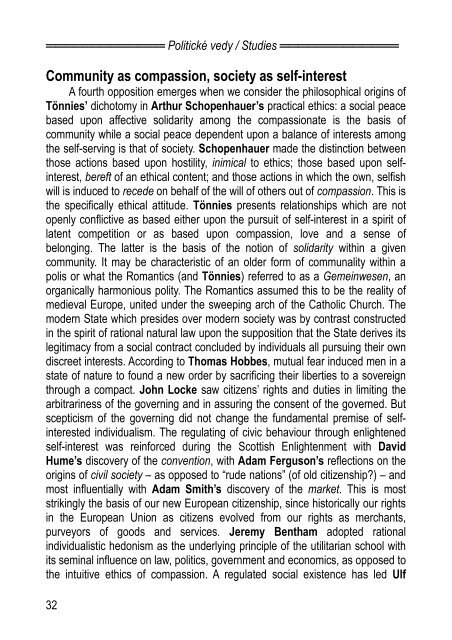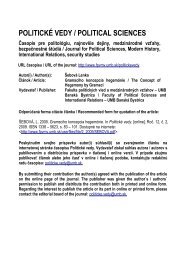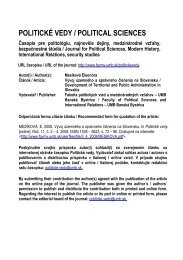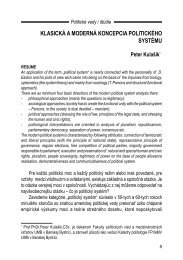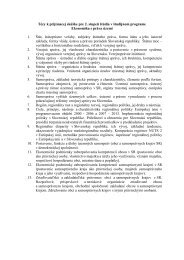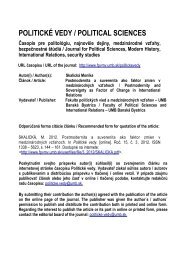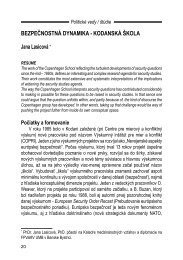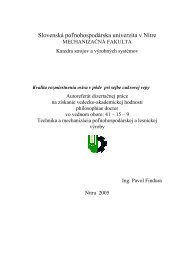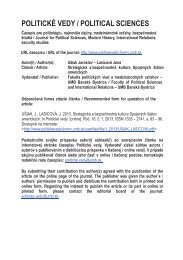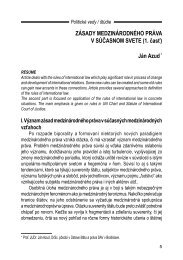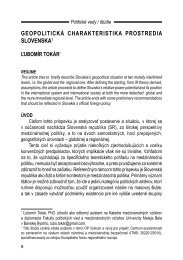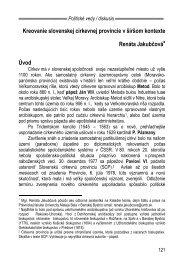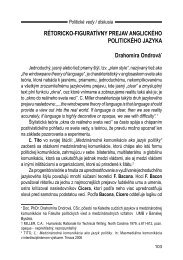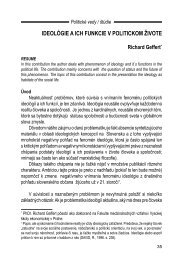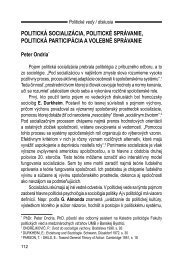Citizenship in Community and Society: Ferdinand ... - Politické vedy
Citizenship in Community and Society: Ferdinand ... - Politické vedy
Citizenship in Community and Society: Ferdinand ... - Politické vedy
Create successful ePaper yourself
Turn your PDF publications into a flip-book with our unique Google optimized e-Paper software.
═════════════ Politické <strong>vedy</strong> / Studies ═════════════<br />
<strong>Community</strong> as compassion, society as self-<strong>in</strong>terest<br />
A fourth opposition emerges when we consider the philosophical orig<strong>in</strong>s of<br />
Tönnies’ dichotomy <strong>in</strong> Arthur Schopenhauer’s practical ethics: a social peace<br />
based upon affective solidarity among the compassionate is the basis of<br />
community while a social peace dependent upon a balance of <strong>in</strong>terests among<br />
the self-serv<strong>in</strong>g is that of society. Schopenhauer made the dist<strong>in</strong>ction between<br />
those actions based upon hostility, <strong>in</strong>imical to ethics; those based upon self<strong>in</strong>terest,<br />
bereft of an ethical content; <strong>and</strong> those actions <strong>in</strong> which the own, selfish<br />
will is <strong>in</strong>duced to recede on behalf of the will of others out of compassion. This is<br />
the specifically ethical attitude. Tönnies presents relationships which are not<br />
openly conflictive as based either upon the pursuit of self-<strong>in</strong>terest <strong>in</strong> a spirit of<br />
latent competition or as based upon compassion, love <strong>and</strong> a sense of<br />
belong<strong>in</strong>g. The latter is the basis of the notion of solidarity with<strong>in</strong> a given<br />
community. It may be characteristic of an older form of communality with<strong>in</strong> a<br />
polis or what the Romantics (<strong>and</strong> Tönnies) referred to as a Geme<strong>in</strong>wesen, an<br />
organically harmonious polity. The Romantics assumed this to be the reality of<br />
medieval Europe, united under the sweep<strong>in</strong>g arch of the Catholic Church. The<br />
modern State which presides over modern society was by contrast constructed<br />
<strong>in</strong> the spirit of rational natural law upon the supposition that the State derives its<br />
legitimacy from a social contract concluded by <strong>in</strong>dividuals all pursu<strong>in</strong>g their own<br />
discreet <strong>in</strong>terests. Accord<strong>in</strong>g to Thomas Hobbes, mutual fear <strong>in</strong>duced men <strong>in</strong> a<br />
state of nature to found a new order by sacrific<strong>in</strong>g their liberties to a sovereign<br />
through a compact. John Locke saw citizens’ rights <strong>and</strong> duties <strong>in</strong> limit<strong>in</strong>g the<br />
arbitrar<strong>in</strong>ess of the govern<strong>in</strong>g <strong>and</strong> <strong>in</strong> assur<strong>in</strong>g the consent of the governed. But<br />
scepticism of the govern<strong>in</strong>g did not change the fundamental premise of self<strong>in</strong>terested<br />
<strong>in</strong>dividualism. The regulat<strong>in</strong>g of civic behaviour through enlightened<br />
self-<strong>in</strong>terest was re<strong>in</strong>forced dur<strong>in</strong>g the Scottish Enlightenment with David<br />
Hume’s discovery of the convention, with Adam Ferguson’s reflections on the<br />
orig<strong>in</strong>s of civil society – as opposed to “rude nations” (of old citizenship) – <strong>and</strong><br />
most <strong>in</strong>fluentially with Adam Smith’s discovery of the market. This is most<br />
strik<strong>in</strong>gly the basis of our new European citizenship, s<strong>in</strong>ce historically our rights<br />
<strong>in</strong> the European Union as citizens evolved from our rights as merchants,<br />
purveyors of goods <strong>and</strong> services. Jeremy Bentham adopted rational<br />
<strong>in</strong>dividualistic hedonism as the underly<strong>in</strong>g pr<strong>in</strong>ciple of the utilitarian school with<br />
its sem<strong>in</strong>al <strong>in</strong>fluence on law, politics, government <strong>and</strong> economics, as opposed to<br />
the <strong>in</strong>tuitive ethics of compassion. A regulated social existence has led Ulf<br />
32


